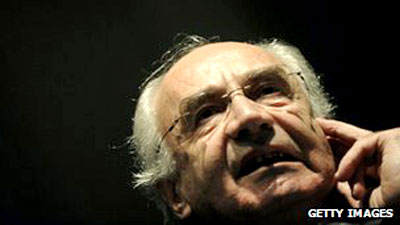|

24 May 2012
from
BBC Website

Mr Gotti
Tedeschi is under investigation
for suspected
money-laundering
The director of the Vatican Bank,
Ettore Gotti Tedeschi, has been
removed from his post for dereliction of duty, the Vatican says.
The bank's board of directors unanimously passed a no-confidence
vote in Mr Gotti Tedeschi, a statement said.
It said he had failed,
"to carry out duties of primary
importance", but it did not elaborate.
In 2010 Italian police launched an
investigation against Mr Gotti Tedeschi as part of a
money-laundering inquiry.
Members of the board believed his dismissal was needed to "maintain
the vitality of the bank", the Vatican statement said.
The board will now look for a new director to restore relations with
the international financial community,
"based on mutual respect for
accepted international banking standards".
Mr Gotti Tedeschi declined to comment on
his dismissal. He told journalists: "I'd rather say nothing,
otherwise I'd say ugly things."
Transparency
But in remarks to the Reuters news agency, he said:
"I have paid for my transparency."
The moves comes as Moneyval, the Council
of Europe body tasked with counteracting money laundering, prepares
to rule at the beginning of July on whether the Vatican meets
international standards on financial transactions.
Memos leaked earlier this year suggest there are serious differences
among Vatican officials over how far to go in ensuring financial
transparency, according to media reports.
The Vatican Bank, known officially as the Institute for Religious
Works (IOR), was created during World War II to administer
accounts held by religious orders, cardinals, bishops and priests.
It lost £250m in
a scandal involving the collapse of
one of Italy's biggest private banks - the Banco Ambrosiano - in
1982, with which it had close ties.
The Vatican Bank has been headed by Mr Gotti Tedeschi, 62, a trained
economist, since 2009. When Mr Gotti Tedeschi was placed under
investigation in 2010, the Vatican said it was "perplexed and
astonished", and expressed full confidence in him.
It said the matter was the result of a misunderstanding, and
that none of its employees was involved in any wrongdoing.
As part of the inquiry, Italian tax police seized 23m Euros ($29m,
£18.4m) that the Vatican Bank had tried to transfer from a small
Italian bank called Credito Artigiano.
A month later, the Vatican set up a new financial authority to
combat money laundering and make its financial operations more
transparent, ahead of an EU deadline.
The move was aimed at winning inclusion in the European Commission's
"white list" of states which comply with international standards
against tax fraud and money-laundering.
|

